The Left-Handed Booksellers of London Read online
Dedication
To Anna, Thomas, and Edward; my parents,
Henry and Katharine Nix; my brothers Simon and Jonathan
and their families; and to all my family and friends.
THIS STORY TAKES PLACE IN A VERSION OF ENGLAND IN THE YEAR 1983, BUT IT IS NOT ENTIRELY AS THOSE WHO WERE ALIVE THEN WILL REMEMBER, OR THOSE WITH A HISTORICAL BENT CAN CHECK UP ON. BUT WHICH IS REAL?
Contents
Cover
Title Page
Dedication
Prologue
Chapter One
Chapter Two
Chapter Three
Chapter Four
Chapter Five
Chapter Six
Chapter Seven
Chapter Eight
Chapter Nine
Chapter Ten
Chapter Eleven
Chapter Twelve
Chapter Thirteen
Chapter Fourteen
Chapter Fifteen
Chapter Sixteen
Chapter Seventeen
Chapter Eighteen
Chapter Nineteen
Chapter Twenty
Chapter Twenty-One
Chapter Twenty-Two
Chapter Twenty-Three
Chapter Twenty-Four
Chapter Twenty-Five
Chapter Twenty-Six
Epilogue
Acknowledgments
About the Author
Books by Garth Nix
Back Ad
Copyright
About the Publisher
Prologue
IT WAS 5:42 A.M. ON MAY DAY, 1983, IN THE WEST OF ENGLAND, AND A sliver of the sun had edged above the ridge. But it was still cool and almost dark in the shallow valley, where the brook ran clear and straight until it made a sweeping left-hand curve before the weir a mile farther downstream.
A bridge of three planks crossed the brook near a farmhouse, carrying the footpath to the farther side, diverting walkers away. Not that this path was ever well-traveled. Walkers somehow failed to see the start of this particular path, under the ancient oak next to the crossroad at the hamlet near the weir.
A young woman came out of the farmhouse, yawning, her eyes half-shut, her mind still mostly lost in a dream that had seemed so real.
Susan Arkshaw, who had turned eighteen years old as of two minutes ago, was striking rather than immediately attractive, with her vibrant black eyebrows in stark contrast to her closely razored head, the stubble dyed white-blond. She wore a 1968 Jimi Hendrix Summer Tour T-shirt given to her mother fifteen years ago by a roadie. The T-shirt was big enough to serve as a nightdress, because she was not tall, though very wiry and muscular. People often thought she was a professional dancer or gymnast, though she was neither.
Her mother, who was tall and slight without the muscle, said Susan took after her father, which was possibly true. Susan had never met him, and this was one of the few details her mother had ever shared.
Susan walked to the brook, and knelt to dip her hand in the cool, clear water. She’d had the recurring dream again, familiar since her childhood. She frowned, trying to recall it in more detail. It always started the same way, here at the brook. She could almost see it. . . .
A disturbance in the water suggested a fish rising at first, until it became a great roiling and splashing, too big for any fish. Slowly, as if drawn up by an invisible rope, a creature rose from the heart of the swift current in the middle of the brook. Its legs and arms and body were made from weed and water, willow sticks and reeds. Its head was a basket shaped of twisted alder roots, with orbs of swirling water as limpid eyes, and its mouth was made of two good-sized crayfish, claws holding tails, crustacean bodies forming an upper and lower lip.
Bubbling and streaming clear, cold water, the creature sloshed a dozen yards across the grass and then stone paving to the house and, raising one long limb, lashed green willow ends upon window glass, once, twice, three times.
The crayfish mouth moved, and a tongue of pondweed emerged to shape words, wet and sibilant.
“I watch and ward.”
The river creature turned, and walking back, lost height and girth and substance, until in the last few paces it became little more than a bundle of stuff such as the brook might throw ashore in flood, the only sign of its presence a trail of mud upon the flagstone path that lined the front of the house.
Susan rubbed her temples and looked behind her. There was a trail of mud on the flagstones. From house to brook. But her mother had probably gotten up even earlier and been pottering about, shuffling in her gum boots. . . .
A raven cawed from the rooftop. Susan waved to it. There were ravens in her dream as well, but bigger ones. Much larger than any that actually existed, and they talked as well, though she couldn’t remember what they said. She always remembered the beginning of the dream best; it got confused after the brook creature.
Besides the ravens, there was also something about the hill above the farmhouse. A creature emerged from the earth there . . . a kind of lizard thing of stone, possibly even a dragon.
Susan smiled, thinking about what all this meant. Her subconscious hard at work fantasizing, fueled by too many fantasy novels and a childhood diet of Susan Cooper, Tolkien, and C. S. Lewis. The brook creature and the huge ravens and the earth lizard should all make up a nightmare, but the dream wasn’t frightening. Quite the reverse, in fact. She always felt strangely comforted after she had the dream.
She yawned hugely and went back to bed. As she crawled under her duvet and sleep claimed her again, she suddenly remembered what one of the huge ravens had said in the dream.
“Gifts your father gave us, we creatures of water, air, and earth, to watch and ward.”
“My father,” said Susan sleepily. “My father . . .”
Later, when her mother brought her tea and toast in bed at eight o’clock, a special treat to celebrate her birthday, Susan had forgotten her earlier awakening, had forgotten she’d had the recurring dream again. But something lingered, she knew she’d dreamed . . .
She looked at her mother sitting on the end of her bed.
“I had an interesting dream last night. I think. Only I can’t remember what happened. It seemed important. . . .”
“It’s good to dream,” said her mother, who lived much in a dream herself. She ran her fingers through her long, luxuriantly black hair, streaked here and there with the white of grief, not age. Jassmine never let anyone cut her hair; she became very agitated when Susan suggested she do more than trim the ends, which she did herself. “Most of the time . . . but there are bad dreams, too. . . .”
“I think my dream . . . I think it was somehow about my father?”
“Oh yes? More tea?”
“Are you sure you can’t tell me who my father is, Mum?”
“Oh no. It was a different time. I wasn’t the same person. He . . . did you say yes to more tea?”
“Yes, Mum.”
They drank more tea, both lost in their own thoughts.
Eventually, Susan said with some determination, “I think I’ll go up to London early. Get acclimatized. There’s bound to be pub work I can get. And I . . . I’ll try to find my dad.”
“What was that, darling?”
“I’m going to go up to London. Before I take my place. Just find some work and so on.”
“Oh. Well. It’s natural, I suppose. But you must be careful. He told me . . . no, that was about something else. . . .”
“Who is ‘he’? What did he say to be careful of, or about?”
“Hmm? Oh, I forget. London. Yes, of course you must go. When I was eighteen I couldn’t imagine being anywhere else. But I insist on postca
rds. You must send me postcards. Trafalgar Square . . .”
Susan waited for Jassmine to continue, but her mother’s voice trailed off and she was staring at the wall, whatever thought had been about to emerge lost somewhere along the way.
“I will, Mum.”
“And I know you will be careful. Eighteen! Happy birthday, my darling. Now, I must get back to my painting before that cloud comes over and ruins the light. Presents later, okay? After second breakfast.”
“Presents later. Don’t miss the light!”
“No, no. You too, darling girl. Even more so for you. Be sure to stay in the light. That’s what he would have wanted.”
“Mum! Who’s ‘he’ . . . come back . . . oh, never mind. . . .”
Chapter One
A clerk there was, sinister gloved
Dexter scorning, his sword well-loved
Wielded mirror-wise, most adept
Bookes and slaughter, in both well kept
A SLIGHT YOUNG MAN WITH LONG FAIR HAIR, WEARING A PRE-OWNED mustard-colored three-piece suit with widely flared trousers and faux alligator-hide boots with two-inch Cuban heels, stood over the much older man on the leather couch. The latter was wearing nothing but a monogrammed silk dressing gown, which had fallen open to reveal an expanse of belly very reminiscent of a puffer fish. His fleshy face was red with anger, jowls still quivering with the shock of being stuck square on his roseate nose with a silver hatpin.
“You’ll pay for this, you little f—” the older man swore, swiping with the cut-throat razor that he’d just pulled out from under one of the embroidered cushions on the couch.
But even as he moved his face lost rigidity, flesh collapsing like a plastic bag brushed against a candle flame. The young man—or perhaps it was a young woman who was dressed like a man—stepped back and watched as the tide of change continued, the flesh within the pale blue robe falling into a fine dust that ebbed away to reveal strangely yellowed bones poking from sleeves and collar, bone in its turn crumbling into something akin to the finest sand, ground small over millennia by the mighty ocean.
Though in this case, it had not taken an ocean, nor millennia. Merely the prick of a pin, and a few seconds. Admittedly a very special pin, though it looked like any other pin made for Georgian-era ladies. This one, however, was silver-washed steel, with Solomon’s great spell of unmaking inscribed on it in letters too small for the unaided eye to see, invisible between the hallmarks that declared it to have been made in Birmingham in 1797 by Harshton and Hoole. Very obscure silversmiths, and not ones whose work was commonly sought after, then or now. They mostly made hatpins, after all, and oddly sharp paper knives.
The young man—for he was a young man, or was tending towards being one—held the silver hatpin in his left hand, which was encased in a pale tan glove of very fine and supple cabretta leather, whereas the elegant fingers of his right hand were free of any such covering. He wore a ring on the index finger of his right hand, a thin gold band etched with some inscription that would need close examination to read.
His gloved left hand was perfectly steady as he slid the pin back into its special pocket in the right sleeve of his suit, its head snug against the half sovereign cuff links (1897, Queen Victoria; the jubilee year, not any old half sovereign) of his Turnbull & Asser shirt. His right hand shook a little as he did so, though not enough to make the hatpin snag a thread.
The slight shake wasn’t because he’d disincorporated crime boss Frank Thringley. It was because he wasn’t supposed to be there at all and he was wondering how he was going to explain—
“Put . . . put your hands up!”
He also wasn’t supposed to be able to be surprised by someone like the young woman who had burst into the room, an X-Acto craft knife in her trembling hands. She was neither tall nor short, and moved with a muscular grace that suggested she might be a martial artist or a dancer, though her Clash T-shirt under dark blue overalls, oxblood Doc Martens, and her buzzed-short dyed blond hair suggested more of a punk musician or the like.
The man raised his hands up level with his head. The knife-wielder was:
1. Young, perhaps his own age, which was nineteen;
2. Almost certainly not a Sipper like Frank Thringley; and
3. Not the sort of young woman crime bosses usually kept around the house.
“What . . . what did you do to Uncle Frank?”
“He’s not your uncle.”
He slid one foot forward but stopped as the young woman gestured with the knife.
“Well, no, but . . . stay there! Don’t move! I’m going to call the police.”
“The police? Don’t you mean Charlie Norton or Ben Bent-Nose or one of Frank’s other charming associates?”
“I mean the police,” said the young woman determinedly. She edged across to the telephone on the dresser. It was a curious phone for Frank Thringley, Merlin thought. Antique, art deco from the 1930s. Little white ivory thing with gold inlay and a straight cord.
“Who are you? I mean, sure, go ahead and call the police. But we’ve probably only got about five minutes before . . . or less, actually—”
He stopped talking and, using his gloved left hand, suddenly drew a very large revolver from the tie-dyed woven yak-hair shoulder bag he wore on his right side. At the same time the woman heard something behind her, something coming up the stairs, something that did not sound like normal footsteps, and she turned as a bug the size of a small horse burst into the room and the young man stepped past her and fired three times boom! boom! boom! into the creature’s thorax, sending spurts of black blood and fragments of chitin across the white Aubusson carpet and still it kept coming, its multi-segmented back legs scrabbling and its hooked forelimbs snapping, almost reaching the man’s legs until he fired again, three more shots, and the huge, ugly bug flipped over onto its back and spun about in frenzied death throes.
As the deafening echoes of the gunshots faded, the woman realized she was screaming, and stopped, since it wasn’t helping.
“What . . . was that?”
“Pediculus humanus capitis. A louse,” replied the young man, who was reloading his revolver, hitching up his waistcoat to take rounds from a canvas bullet belt. “Made bigger, obviously. We really have to go. Name’s Merlin, by the bye.”
“Like Merlin the magician?”
“Like Merlin the wizard. And you are?”
“Susan,” said Susan automatically. She stared at the still-twitching giant louse on the carpet, then at the pile of reddish dust on the lounge, contained by the pale blue robe. The monogram “FT” was uppermost, as if pointing out who the dust used to be.
“What the hell is going on?”
“Can’t explain here,” said Merlin, who had gone to the window and was lifting the sash.
“Why not?” asked Susan.
“Because we’ll both be dead if we stay. Come on.”
He went out through the window.
Susan looked at the phone, and thought about calling the police. But after a single second more of careful but lightning-fast thought, she followed him.
Chapter Two
A left-handed bookseller I did spy
In a wood one darkling day
I durst not ask their business, why
Best not to know, I do say
THE WINDOW OPENED ABOVE THE ROOF OF THE CONSERVATORY, which ran from the back of the house to the fence. Beyond that lay the dark mass of Highgate Wood. Merlin was walking out along the steel ridgeline of the conservatory, Cuban-heeled boots notwithstanding. The flat ridge was no wider than his hand, with long sloping panes of glass on either side. But he acted as if they were of no account, though if he fell he’d smash through them and be cut to pieces.
Susan hesitated and looked back. The monstrous bug was still writhing, but there was something else happening now. A dark fog was flowing up the stairs. It looked like thick black smoke, but it moved very slowly and she couldn’t smell burning. Whatever it was, she instinctively knew
it was wrong, something inimical. She shivered suddenly, bent down, and crawled out onto the ridge of the conservatory, moving swiftly on hands and knees.
“There’s a weird black fog coming up the stairs,” she panted as she reached the end. Merlin was standing in front of her, but as she spoke he jumped, clear across to a branch from an ancient oak that overhung the garden fence.
“How can you do that in those heels?” gasped Susan.
“Practice,” said Merlin. He held on to a higher branch with his right hand and extended his left. “Jump.”
Susan looked behind her. The extraordinarily dense, dark fog was already coiling out the window. It didn’t move like normal fog at all; in fact, one broad tendril was coiling out towards her specifically. Reaching for her. . . .
She jumped. Merlin leaned out to her but Susan didn’t need help, landing close to the trunk and immediately steadying herself by wrapping her arms around it.
“Down,” said Merlin, climbing quickly. “Fast!”
Susan followed him, jumping the last five feet, her Docs splattering hard into the leaf mulch and mud. It had been raining most of the day, though it had eased off at nightfall. Now, past midnight, it was simply clammy.
The wood was very dark. All the light was behind them, spilling out of the houses and streetlights onto Lanchester Road.
The black fog was streaming over the conservatory, flowing down the panes on either side of the ridge. Spreading and extending, blending into the night once it moved outside the fall of light from the houses and street.
“What is that?”
“More to explain later,” said Merlin. “Follow me. We have to get to the old straight track.”
He led off, almost jogging, zigzagging between trees. Susan followed, hands up to ward off snapping-back branches and saplings. She couldn’t see anything clearly. Merlin was a dark shape ahead; she had to trust he could see where he was going and try to stay right behind.
A few minutes later she almost ran into Merlin’s back as he came out onto a path. He hesitated for a moment, looking left and right and then up at the cloudy sky, and the very few visible stars.

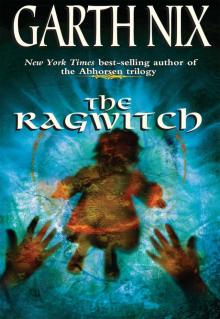 The Ragwitch
The Ragwitch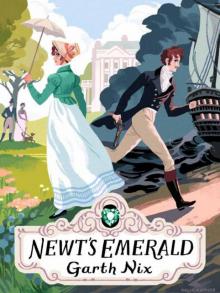 Newt's Emerald
Newt's Emerald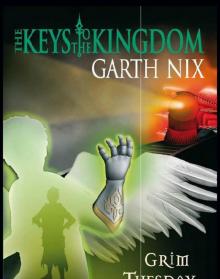 Grim Tuesday
Grim Tuesday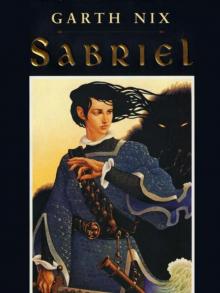 Sabriel
Sabriel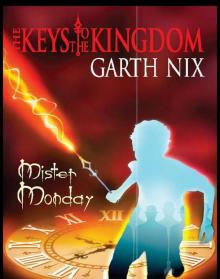 Mister Monday
Mister Monday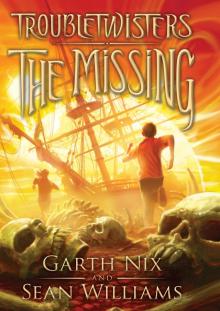 The Missing
The Missing The Fall
The Fall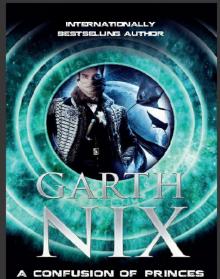 A Confusion of Princes
A Confusion of Princes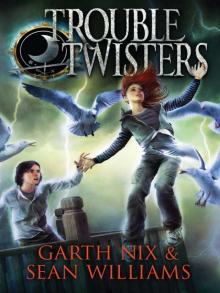 Troubletwisters
Troubletwisters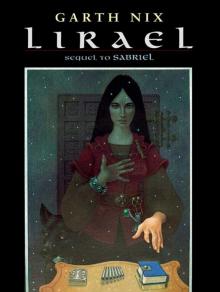 Lirael
Lirael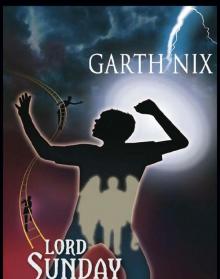 Lord Sunday
Lord Sunday Clariel
Clariel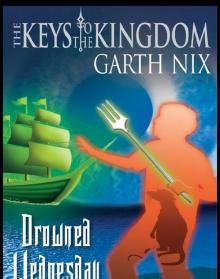 Drowned Wednesday
Drowned Wednesday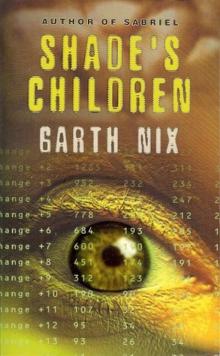 Shade's Children
Shade's Children The Violet Keystone
The Violet Keystone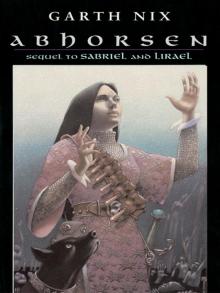 Abhorsen
Abhorsen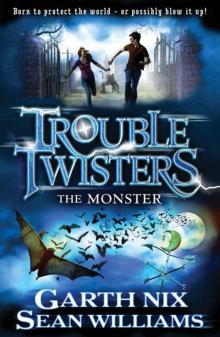 The Monster
The Monster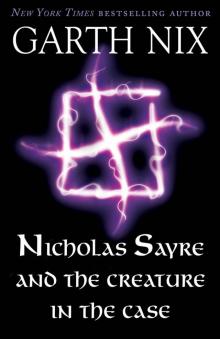 The Creature in the Case
The Creature in the Case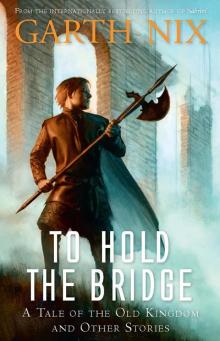 To Hold the Bridge
To Hold the Bridge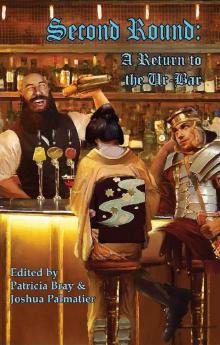 Second Round: A Return to the Ur-Bar
Second Round: A Return to the Ur-Bar Above the Veil
Above the Veil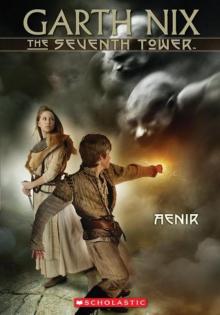 Aenir
Aenir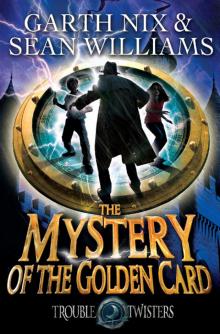 Mystery of the Golden Card
Mystery of the Golden Card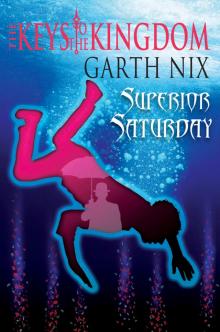 Superior Saturday
Superior Saturday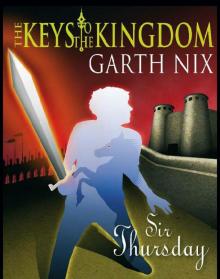 Sir Thursday
Sir Thursday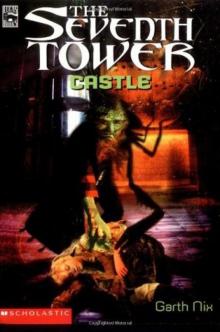 Castle
Castle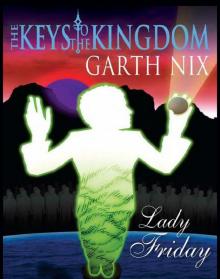 Lady Friday
Lady Friday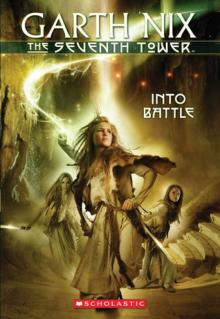 Into Battle
Into Battle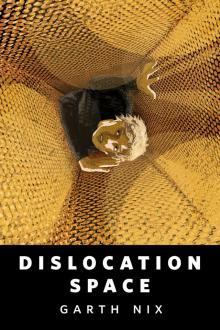 Dislocation Space
Dislocation Space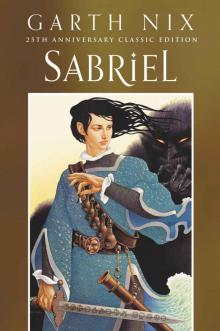 Sabriel (Old Kingdom Book 1)
Sabriel (Old Kingdom Book 1) Sir Hereward and Mister Fitz Go to War Again shamf-1
Sir Hereward and Mister Fitz Go to War Again shamf-1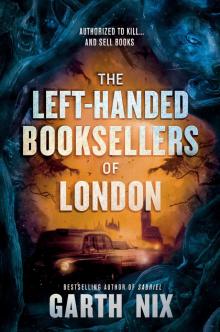 The Left-Handed Booksellers of London
The Left-Handed Booksellers of London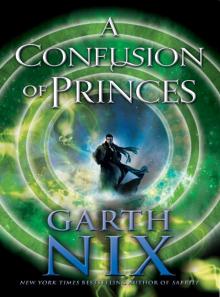 Novel - A Confusion of Princes
Novel - A Confusion of Princes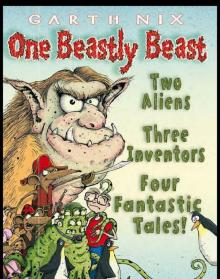 One Beastly Beast
One Beastly Beast A Suitable Present for a Sorcerous Puppet shamf-3
A Suitable Present for a Sorcerous Puppet shamf-3 Beyond the Sea Gates of the Scholar Pirates of Sarsköe shamf-2
Beyond the Sea Gates of the Scholar Pirates of Sarsköe shamf-2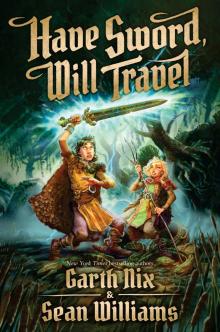 Have Sword, Will Travel
Have Sword, Will Travel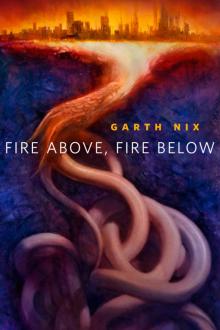 Fire Above, Fire Below
Fire Above, Fire Below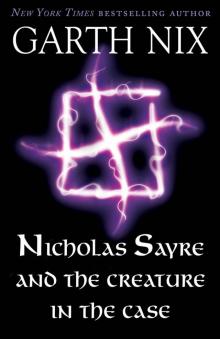 Nicholas Sayre and the Creature in the Case
Nicholas Sayre and the Creature in the Case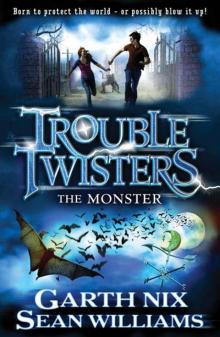 The Monster (Troubletwisters)
The Monster (Troubletwisters)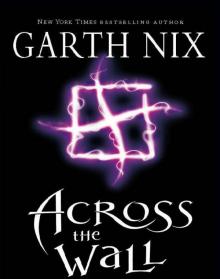 Across the Wall
Across the Wall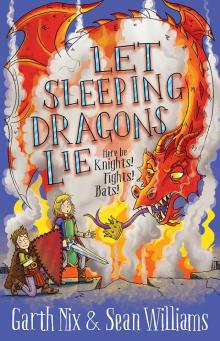 Let Sleeping Dragons Lie
Let Sleeping Dragons Lie![[Abhorsen 03a] - Across the Wall Read online](http://i1.bookreadfree.com/i2/04/12/abhorsen_03a_-_across_the_wall_preview.jpg) [Abhorsen 03a] - Across the Wall
[Abhorsen 03a] - Across the Wall